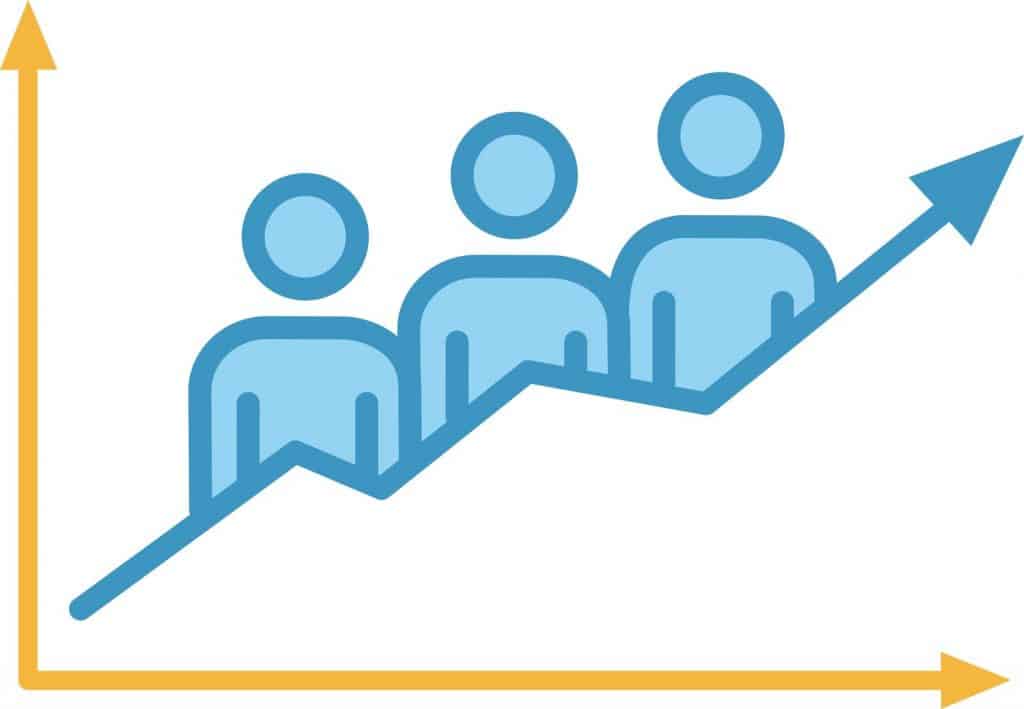Social media has become an integral part of modern life and businesses have been quick to capitalize on this powerful platform.
With over 3.5 billion active users on social media, it’s no wonder that businesses are using it to reach their target audience.
But the impact of social media on business goes far beyond just advertising.
From influencing customer decisions to creating a more efficient workplace, social media has revolutionized how businesses operate in the 21st century.
In this article, we’ll explore nine ways that social media impacts business.
1. Brand Awareness
Social media is a powerful tool for businesses to increase brand awareness and reach a wider audience.
Platforms such as Facebook, Instagram, and Twitter allow businesses to:
- Connect with potential customers
- Showcase their products or services
Brand awareness is crucial as it establishes a connection with potential customers, making them more likely to purchase from the brand in the future.
Social media allows businesses to reach a wider audience than ever before, increasing the potential customer base and the chances of them being aware of the brand.

Targeted posts and campaigns on social media can help businesses reach their desired audience by using demographics, interests, and behaviors to target specific groups of people.
This ensures the business’s message is reaching the right people at the right time.
By reaching the right audience, businesses can establish a connection with potential customers, a crucial step in creating brand awareness.
Social media also provides businesses with valuable insights into their customer base through analytics and engagement metrics.
This allows businesses to understand how their target audience is interacting with their brand and tailor their marketing efforts to better meet the needs and desires of their customers.
By understanding the customer’s needs, businesses can create a more personalized experience for them, which can help to increase brand awareness.
Additionally, social media allows businesses to create a personal connection with their customers by providing a platform for two-way communication.
This can help to establish trust and loyalty, leading to increased brand awareness and ultimately, increased sales.
2. Customer Engagement
Social media provides businesses with a direct line of communication to their customers, allowing them to engage with them in real-time and build stronger relationships.
Platforms like Twitter and Facebook provide businesses with a platform to address customer concerns and provide customer service quickly and efficiently.
This can lead to increased customer satisfaction and loyalty.
Customer engagement on social media can also provide businesses with valuable feedback from their customers.
Platforms such as Twitter and Facebook allow customers to leave reviews and comments on a business’s page, providing businesses with a direct insight into what their customers like and dislike about their products or services.

This feedback can be used to improve products and services, which can lead to increased customer satisfaction and repeat business.
Businesses can also use social media to create a sense of community among their customers.
By creating groups, forums and discussion boards, businesses can foster a sense of community and encourage customers to engage with one another.
This can lead to increased brand loyalty and customer retention.
In addition, businesses can use social media to create interactive campaigns and contests, which can increase engagement and attract new customers.
For example, businesses can use Instagram stories to create polls and quizzes or launch a social media contest.
These types of campaigns can help to increase engagement and improve brand awareness.
3. Lead Generation
Social media is a powerful tool for businesses to generate leads and attract potential customers.
By creating engaging and relevant content that resonates with their target audience, businesses can drive users to their website where they can sign up for newsletters or request more information.
This can help businesses to build a database of leads that they can nurture and convert into paying customers.
One effective strategy for lead generation on social media is to use social media advertising.
Platforms such as Facebook and Instagram allow businesses to target specific demographics and interests, which can help to increase the chances of reaching potential customers.
Advertisements can be used to drive users to landing pages where they can sign up for newsletters or request more information.

Businesses can also use social media to host promotions and giveaways as a way to drive leads.
For example, a business can use Facebook to run a contest where participants are required to provide their contact information to enter.
This can help the business to generate leads and build a database of potential customers.
Another way to generate leads is by using social media to create a sense of exclusivity and urgency.
For instance, businesses can use Instagram stories or Facebook live videos to share exclusive content, promotions or limited-time offers that are only available to those who sign up for a newsletter or follow a link.
Moreover, businesses can use social media to provide valuable information and resources that can help to establish them as thought leaders in their industry.
By providing valuable content, businesses can attract potential customers and generate leads.
4. Search Engine Optimization
Social media can have a positive impact on a business’s search engine optimization (SEO) by helping to improve their rankings on search engine results pages.
Search engines such as Google and Bing use complex algorithms to determine the relevance and authority of a website, and social media can play a role in this process.
One way that social media can impact SEO is by creating content that is engaging, shareable, and optimized for search engines.
By creating high-quality, informative content that is relevant to their target audience, businesses can attract more visitors to their website, which can improve their search engine rankings.
Additionally, by optimizing the content with relevant keywords and meta tags, businesses can make it easier for search engines to understand what the content is about and increase the chances of it appearing in search results.

Another way that social media can impact SEO is by linking to a business’s website.
Social media platforms such as Facebook and Twitter allow businesses to include links to their website in their posts and profiles.
When other users share or interact with these posts, it can lead to more links pointing to the website, which can help to improve its search engine rankings.
Social media can also help businesses to build brand awareness and increase their online visibility, which can ultimately lead to increased traffic to their website.
When users search for a business or its products/services, they are more likely to find the business if it has a strong presence on social media platforms.
Additionally, social media can also be used to reach out to influencers, who can help to promote the business and generate backlinks to the website.
These backlinks can help to boost the website’s search engine rankings and increase its visibility.
5. Increased Traffic
Social media can be an effective tool for businesses to drive more traffic to their website.
By creating engaging and shareable content, businesses can attract more visitors to their website, which can ultimately lead to increased sales and revenue.
One way to drive more traffic is by creating high-quality and informative content that is relevant to the target audience.
Businesses can use social media platforms such as Facebook, Instagram, and Twitter to share blog posts, infographics, videos, and other types of content that can attract visitors to their website.
By consistently creating and sharing valuable content, businesses can build a following and attract more visitors to their website over time.

Another way to drive more traffic is by using social media to advertise the website.
Platforms such as Facebook and Instagram allow businesses to create targeted ads that can be shown to specific demographics, interests, and behaviors.
By using social media ads, businesses can increase their reach and attract more visitors to their website.
Additionally, businesses can use retargeting ads to show ads to people who have previously visited their website but haven’t converted yet.
Businesses can also use social media to host promotions and giveaways as a way to drive traffic.
For example, a business can run a contest on Instagram where participants are required to visit the website to enter, which can help to increase traffic to the website.
Additionally, social media can be used to build relationships with influencers in the industry, who can help to promote the business and drive more traffic to the website.
Influencer marketing can help to reach a wider audience and attract more visitors to the website.
6. Brand Loyalty
Social media can be an effective tool for businesses to foster loyalty among their customers.
By building relationships with their customers and engaging with them on a personal level, businesses can create a sense of trust and connection that can lead to increased brand loyalty.
One way to foster loyalty is by creating a presence on social media platforms such as Facebook, Twitter, and Instagram.
This allows businesses to connect with their customers and provide them with valuable information, offers and experiences.
By providing consistent and relevant content, businesses can build trust and establish a connection with their customers.
Another way to foster loyalty is through two-way communication on social media.

By responding to customer comments and messages in a timely and personal manner, businesses can show that they value their customers’ opinions and are willing to listen to their feedback.
This can help to establish trust and create a sense of loyalty among customers.
Furthermore, businesses can use social media to gain insight into their customers’ needs and desires.
Social media platforms provide businesses with analytics and engagement metrics that allow them to understand how their customers are interacting with their brand.
By understanding their customers’ needs and desires, businesses can tailor their products and services to better meet those needs, which can lead to increased loyalty.
Additionally, businesses can use social media to reward their loyal customers with discounts and special offers.
For example, by creating a loyalty program or a VIP group on social media, businesses can offer exclusive discounts, coupons or early access to new products or services to their loyal customers.
This can help to create a sense of exclusivity and appreciation among customers, leading to increased loyalty.
7. Cost Savings
Utilizing social media can help businesses cut costs by reducing marketing expenses and lowering expenses associated with physical events.
One way to save money is by utilizing social media for marketing.
Social media platforms such as Facebook, Instagram, and Twitter offer businesses the opportunity to reach a wide audience at a relatively low cost.
By creating engaging and shareable content, businesses can increase their visibility and attract more customers without the high costs associated with traditional advertising methods.
Additionally, social media advertising can be very targeted, which can help to increase the return on investment (ROI) and make the campaigns more cost-effective.
Another way to save money is by using social media to host virtual events, which can save businesses money on travel costs and venue rentals.

For example, businesses can use platforms like Zoom or Facebook Live to host webinars, conferences, and other events, which eliminates the need for physical venues and reduces costs associated with travel and accommodation.
Social media can also help businesses to save money on customer service and support.
By providing customer service on social media platforms, businesses can reduce the costs associated with call centers and other traditional customer service channels.
Additionally, social media can be used to provide customers with self-service options and resources, which can help to reduce the number of customer support requests, further reducing costs.
Furthermore, businesses can use social media to conduct market research and gain insights into their customers, which can help to inform product development and marketing strategies.
This can help businesses to make more informed decisions and avoid costly mistakes.
8. Employee Engagement
Using social media can enhance employee engagement, leading to improved productivity and satisfaction for your business.
By utilizing platforms like Twitter, Facebook, and LinkedIn, businesses can communicate with their employees in real-time, providing valuable feedback and fostering a sense of team spirit and loyalty.
One way to engage employees is by using social media to provide regular updates and communicate important information.
By keeping employees informed about company news and developments, businesses can increase their engagement and motivation.
Additionally, businesses can use social media to create a sense of community among employees, fostering a sense of belonging and engagement.
Another way to engage employees is by using social media to recognize and reward their achievements.

For example, businesses can use social media to share employee testimonials, which can help to boost morale and increase engagement.
Additionally, businesses can use social media to create internal recognition programs that allow employees to acknowledge and appreciate their colleagues’ contributions, which can help to foster a sense of teamwork and loyalty.
Businesses can also use social media to provide employees with opportunities for professional development and growth.
For example, they can create internal groups or communities on social media where employees can share their knowledge and learn from one another.
Additionally, businesses can use social media to share educational content and resources that can help employees improve their skills.
Furthermore, social media can be used to create a culture of transparency and open communication.
By encouraging employees to share their thoughts, feedback, and suggestions on social media, businesses can create a sense of trust and mutual respect among employees, which can lead to increased engagement.
9. Competitive Advantage
Social media can provide businesses with a powerful tool to gain a competitive edge by staying ahead of their competition and gaining valuable insights into their target audience.
One way to gain a competitive advantage is by utilizing the power of social media to gain insights into customer preferences and behaviors.
Social media platforms provide businesses with access to vast amounts of data, including customer demographics, interests, and preferences.
By analyzing this data, businesses can gain valuable insights into their target audience and tailor their products and services to better meet their needs.
Another way to gain a competitive edge is by using social media to monitor competitors and stay on top of industry trends.
Businesses can use social media to track the activity of their competitors, including the content they are publishing, the campaigns they are running, and the engagement they are receiving from their audience.
By staying informed about their competition’s activities, businesses can adjust their own strategies to stay ahead of the curve.

Additionally, businesses can use social media to build brand awareness, which can help them to stand out from their competition.
By creating a strong and consistent presence on social media, businesses can increase their visibility, attract more customers and establish themselves as a leader in their industry.
Social media can also be used to build relationships with influencers in the industry, who can help to promote the business and generate backlinks to the website.
This can help to increase the website’s visibility, attract more customers, and ultimately gain a competitive edge.
Furthermore, social media can be used to provide valuable information and resources that can help to establish businesses as thought leaders in their industry.
By providing valuable content, businesses can attract potential customers, gain a reputation as an expert in their field and ultimately gain a competitive edge.
Conclusion
In conclusion, social media can have a significant impact on businesses in a variety of ways.
It can be used to increase brand awareness, improve customer engagement, generate leads, improve search engine optimization, drive more traffic to the website, foster brand loyalty, save cost, engage employees and gain a competitive edge.
By building a presence on social media platforms, businesses can reach a wider audience than ever before and target their message to their specific audience.
Social media also provides businesses with valuable insights into their customer base, allowing them to tailor their marketing efforts and products/services to meet the needs and desires of their customers.
Additionally, social media can be used to provide customer service and support, and to host virtual events, which can save businesses money on travel and venue costs.
Social media can also be used to conduct market research, gain insights into their customers, and make informed decisions.
Furthermore, social media can be used to recognize and reward employees, foster a sense of team spirit and loyalty and provide opportunities for professional development and growth.
Lastly, social media can be used to gain a competitive edge by monitoring competitors and staying on top of industry trends, building brand awareness, building relationships with influencers, providing valuable information and resources, and standing out from the competition.
Overall, social media can be a powerful tool for businesses to improve their bottom line and stay ahead of their competition.
By utilizing social media in the right way, businesses can increase their visibility, attract more customers, and ultimately improve their bottom line.

